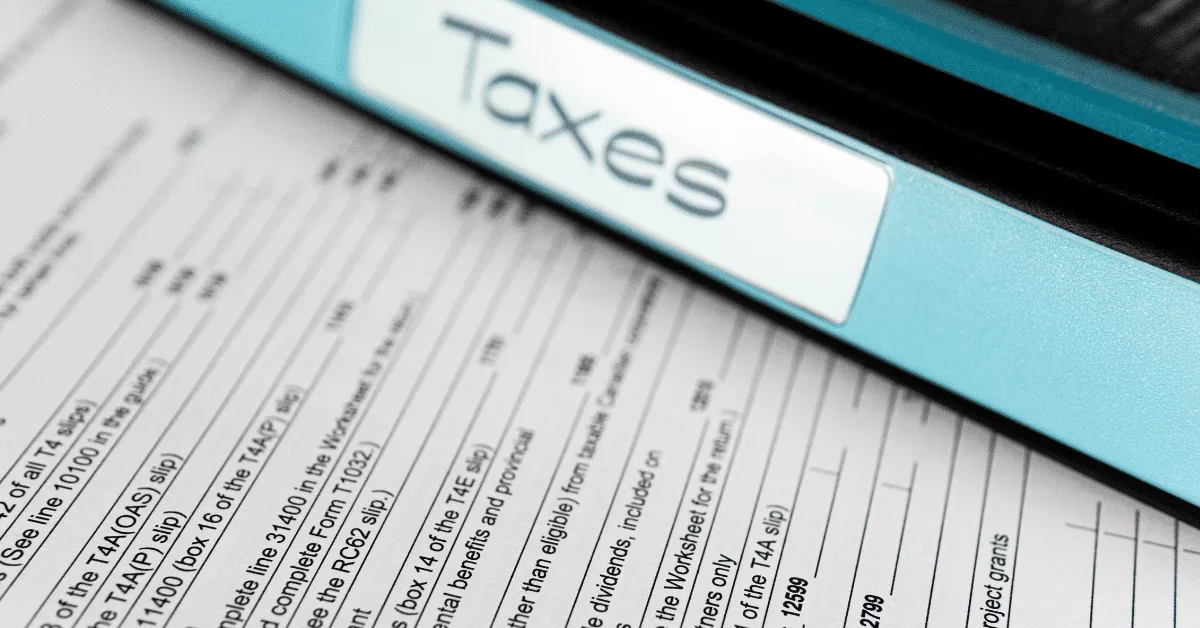
For many individuals, the thrill of gambling and the prospect of hitting a jackpot or scoring big at a casino can be an exhilarating experience. This blog aims to shed light on the often-confusing terrain of reporting gambling winnings to the CRA.
Understanding the rules and obligations regarding reporting gambling earnings can not only prevent legal and financial issues but also promote responsible gambling practices.
Whether you’re an occasional gambler or a seasoned player, navigating the taxation landscape related to gambling winnings in Canada is crucial. This guide will serve as a comprehensive resource, offering a clear understanding of the reporting process, compliance expectations, and tips for managing gambling income while staying in line with the CRA’s requirements.
By the end of this blog, readers will be better equipped to handle their gambling earnings and fulfill their responsibilities to the CRA while enjoying their gaming activities responsibly.
Do You Report Gambling Winnings To The CRA?
In Canada, reporting gambling winnings to the Canada Revenue Agency (CRA) is required. Any income earned from gambling activities, whether it’s from lotteries, casinos, horse racing, or other games of chance, is generally considered taxable. The CRA expects individuals to report these earnings as part of their income, adhering to specific guidelines for accurate taxation.
The types of gambling income that are taxable include winnings from casinos, lotteries, raffles, and even earnings from sports betting or poker tournaments. It’s essential to keep detailed records of all gambling activities, including wins and losses, to accurately report the net income for taxation purposes.
While gambling winnings are generally considered taxable, there are thresholds and exemptions for reporting to the CRA. For instance, casual gamblers with minimal winnings may not need to report their earnings. However, professional gamblers or individuals with substantial winnings surpassing specific thresholds are required to report and pay taxes on their gambling income.
Reporting gambling winnings to the CRA involves understanding the necessary steps and documentation required. The T4A slip is typically used to report gambling winnings and is provided by certain institutions, such as casinos, as a statement of income earned. Individuals can also use the T4A form to report any other gambling winnings.
Non-compliance with reporting gambling earnings to the CRA can lead to penalties and legal issues. It’s crucial to meet the tax obligations by accurately reporting gambling income and ensuring compliance with the set deadlines.
Overall, reporting gambling winnings to the Canada Revenue Agency is a vital responsibility for individuals involved in any form of gambling. By understanding the types of taxable income, meeting reporting requirements, and maintaining accurate records, individuals can ensure compliance with the CRA while enjoying their gambling activities responsibly.
Tax Obligations On Gambling Winnings
Which Gambling Winnings Are Taxable In Canada?
In Canada, the taxation of gambling winnings is handled under the Income Tax Act. The general principle is that any income derived from gambling activities is considered taxable, but there are nuances and specific situations that affect the taxability of these earnings. Here’s an overview of which gambling winnings are generally considered taxable in Canada:
- Casino Winnings: Any money earned from casino games, including slot machines, table games like blackjack, poker, roulette, and other games of chance, are considered taxable income. This encompasses both physical and online casinos.
- Lottery and Raffle Winnings: Money received from lottery wins, raffle prizes, or any other form of draw where individuals win money or prizes is usually subject to taxation. This includes winnings from national or provincial lotteries, sweepstakes, or any other form of contest-based earnings.
- Horse Racing and Sports Betting Winnings: Earnings from betting on horse racing, sports betting, or any other form of sports gambling, including online sportsbooks, are considered taxable income.
- Poker Tournaments and Other Gaming Events: Winnings from poker tournaments, both live and online, and other gaming events where money or prizes are won are also generally taxable.
However, it’s essential to consider a few key factors:
- Thresholds and Exemptions: While these winnings are taxable, there are thresholds and exemptions. In most cases, casual gamblers who win modest amounts may not be required to report their earnings to the Canada Revenue Agency. However, professional gamblers or individuals with significant gambling earnings above certain thresholds are obligated to report and pay taxes on their winnings.
- Proper Documentation: Keeping meticulous records of all gambling activities, including wins, losses, expenses, and dates, is crucial. This documentation not only helps in accurate reporting but also in justifying any claims or deductions associated with gambling losses.
- Tax Deductions and Offsetting Losses: Canadian tax laws permit deductions for gambling losses against gambling winnings. This can reduce the overall taxable income, provided there’s sufficient documentation to support these deductions.
Understanding which gambling winnings are taxable in Canada is vital for ensuring compliance with the CRA’s regulations. While most gambling income is subject to taxation, being aware of exemptions, thresholds, and the importance of proper record-keeping can aid individuals in managing their tax obligations efficiently.
Different Types Of Gambling Income And Their Tax Implications
In Canada, various types of gambling income exist, each with its unique characteristics and associated tax implications:
- Casino Winnings: Money won from casino games—slots, table games (like poker, blackjack, roulette), and other games of chance—is taxable. Casinos issue T4A slips to report the earnings, which individuals use to report their income to the CRA.
- Lottery, Raffle, and Contest Winnings: Winnings from lotteries, raffles, and contests are subject to taxation. Whether from national lotteries, provincial games, sweepstakes, or other contests, these winnings need to be reported as income.
- Horse Racing and Sports Betting: Income earned from betting on horse racing, sports betting, and other forms of sports gambling is considered taxable. Documentation of earnings and losses from these activities is necessary for accurate reporting to the CRA.
- Poker Tournaments and Other Gaming Events: Winnings from poker tournaments, whether live or online, and other gaming events where money or prizes are won, are taxable. Individual participants in such events are responsible for reporting their earnings to the CRA.
It’s crucial to note that while these types of gambling income are generally taxable, there are certain exemptions and thresholds that impact the taxation process:
- Thresholds and Exemptions: For casual gamblers with minimal winnings, there might be exemptions from reporting to the CRA. However, professional gamblers or individuals with substantial earnings exceeding specific thresholds are obligated to report and pay taxes on their gambling income.
- Record-Keeping: Keeping detailed records of all gambling activities, including wins, losses, and related expenses, is crucial. It not only assists in accurate reporting but also in justifying claims or deductions associated with gambling losses.
- Tax Deductions: Canadian tax laws permit deductions for gambling losses against gambling winnings, potentially reducing the overall taxable income, provided there’s sufficient documentation supporting these deductions.
Understanding the various types of gambling income and their specific tax implications is essential for individuals involved in gambling activities. It helps in complying with the CRA’s regulations, ensuring accurate reporting, and managing tax obligations efficiently.
Thresholds And Exemptions For Reporting Gambling Income To The CRA
In Canada, while most gambling income is generally considered taxable, there are specific thresholds and exemptions dictating the reporting requirements to the Canada Revenue Agency (CRA):
- Thresholds for Reporting: If an individual’s gambling activities are infrequent and they win modest amounts that are not their primary source of income, they might not be required to report these winnings to the CRA. Those who earn significant amounts from gambling activities may surpass the threshold requiring them to report their earnings. The CRA might consider this as a primary source of income and necessitate reporting.
- Exemptions and Deductions: Casual gamblers with smaller, occasional winnings may not be mandated to report these earnings. There’s a level of practicality applied to prevent an excessive burden on reporting for minimal gains. Canadian tax laws allow individuals to deduct gambling losses from their winnings when reporting income. These losses can offset the overall taxable income, reducing the tax burden if properly documented.
- Tax Forms and Documentation: Casinos and other gaming institutions often issue T4A slips to report significant gambling winnings to the individual and the CRA. It’s crucial to accurately use these slips for reporting income. Regardless of meeting the thresholds or exemptions, maintaining meticulous records of all gambling activities, including wins, losses, and related expenses, is crucial. These records support any claims or deductions and aid in accurate reporting to the CRA.
Understanding these thresholds and exemptions is critical for individuals engaged in gambling activities. While some may not meet the threshold for mandatory reporting, maintaining proper documentation and keeping accurate records is essential. This not only ensures compliance with the CRA but also allows for the possibility of claiming deductions and minimizing the tax burden related to gambling income.
Reporting Process And Compliance With The CRA
How To Report Gambling Winnings To The CRA?
Reporting gambling winnings to the Canada Revenue Agency (CRA) involves several steps and specific documentation. Here’s a guide on how to report these earnings accurately:
- Accurate Record-Keeping: Maintain detailed records of all gambling activities, including dates, types of games, winnings, and losses. Keep receipts, tickets, statements, and any other relevant documentation.
- Understand Taxable Income: Determine the types of gambling income received and understand the tax implications for each type of game or activity.
- T4A Slips from Casinos: Casinos or other gaming establishments issue T4A slips to report significant gambling winnings. Ensure you receive and retain these slips for accurate reporting to the CRA.
- Prepare T4A and Other Forms: If you have received T4A slips, use the information from these slips to report your gambling income on your tax return. Use the appropriate section on the tax return to declare this income. Additionally, if you have other gambling income not covered by T4A slips, report these earnings using the appropriate forms provided by the CRA.
- Record Winnings and Losses: Calculate your net gambling income by subtracting losses from winnings. You can deduct gambling losses from your winnings if you’ve maintained accurate records to support these deductions.
- Complete Your Tax Return: Report your gambling income on the appropriate line of your tax return. Include the total gambling income after accounting for any allowable deductions. Follow the instructions provided by the CRA for accurately filling out your tax return.
- File by the Deadline: Ensure you file your tax return by the deadline set by the CRA. Missing the deadline can result in penalties and interest charges.
- Seek Professional Advice if Needed: If you’re unsure about how to report your gambling income or have complex gambling-related earnings, consider seeking advice from a tax professional or accountant. They can provide guidance and ensure accurate compliance with the CRA regulations.
- Stay Informed: Keep up-to-date with any changes or updates in tax laws or regulations related to reporting gambling income. The CRA periodically updates guidelines, and being aware of these changes can help in accurate reporting.
Accurate and timely reporting of gambling income is crucial to comply with CRA regulations. Proper record-keeping, using the right forms, and understanding the deductions available can help in accurately reporting gambling income and minimizing tax liabilities.
Forms And Documentation Required For Accurate Reporting
Accurate reporting of gambling income to the Canada Revenue Agency (CRA) requires specific forms and documentation. Here’s a breakdown of the necessary forms and the type of documentation needed for accurate reporting:
- T4A Slip (Statement of Pension, Retirement, Annuity, and Other Income): Casinos and other gaming institutions issue T4A slips to report significant gambling winnings. These slips detail the amount of income earned from gambling activities. Retain these slips as they serve as essential documentation for accurate reporting to the CRA.
- Record of Gambling Activities: Maintain detailed records of all gambling activities, including dates, types of games played, winnings, and losses. Keep all relevant receipts, tickets, statements, or any other supporting documentation. Accurate records are crucial in justifying reported income and any deductions claimed against winnings.
- Personal Income Tax Return: Use the appropriate sections of your personal income tax return to report gambling income. Depending on the nature of the income, different sections or schedules might be applicable. Complete the tax return accurately and ensure that all gambling income is declared.
- Other CRA Forms and Schedules: Depending on the specifics of your gambling income, additional forms or schedules issued by the Canada Revenue Agency (CRA) may be necessary for accurate reporting. For instance, if your gambling activities are part of a business operation and generate income as a professional gambler, specific business-related forms might be required to report this income correctly. The CRA often mandates distinct forms tailored to businesses or self-employment activities to accurately document earnings from professional gambling endeavors.
- Bank and Financial Statements: In cases where gambling activities are conducted online or involve transactions through financial institutions, retain bank and financial statements that detail transactions related to gambling. These statements can serve as supplementary documentation to support your reported income.
- Documentation of Losses: Supporting documentation for losses is equally important. Keep track of losses, such as losing tickets, bank withdrawal statements, or any other evidence that validates these losses.
- Receipts and Statements from Online Gaming Platforms: If gambling activities involve online platforms or apps, retain receipts, statements, or any documentation provided by these platforms as evidence of income earned and losses incurred.
Accurate reporting of gambling income requires thorough record-keeping and documentation. Utilizing T4A slips from casinos, maintaining personal records, and retaining all relevant receipts and statements are essential for accurately reporting gambling income to the CRA. This documentation not only supports the reported income but also validates any deductions claimed against those earnings.
Deadlines And Penalties For Non-compliance
In Canada, adhering to tax deadlines and compliance with the Canada Revenue Agency (CRA) is crucial. Specific deadlines exist for reporting income, including gambling earnings, and failing to meet these deadlines or comply with CRA regulations can result in penalties and interest charges.
- Tax Filing Deadlines: The tax filing deadline for individuals in Canada is typically April 30th. However, if April 30th falls on a weekend or a holiday, the deadline is extended to the next business day. Individuals with self-employment income have until June 15th to file their taxes. But it’s important to note that any balance owing is still due by April 30th.
- Late Filing Penalties: If you fail to file your tax return by the deadline, the CRA can impose late filing penalties. The penalty is typically 5% of the balance owing, plus an additional 1% of the balance for each full month the return is late, up to a maximum of 12 months.
- Interest on Unpaid Taxes: Any taxes owed but not paid by the filing deadline will accumulate interest. The CRA charges compound daily interest on any outstanding balance, accruing from the day after the tax filing due date. The current interest rate is set by the CRA and can change periodically.
- Failure to Report Gambling Income: Not reporting gambling income to the CRA can lead to penalties and possible audits. If the CRA discovers unreported income during an audit or through other means, penalties and interest charges can be imposed in addition to the taxes owed.
- Penalties for Misrepresentation: If the CRA finds that there was a misrepresentation or deliberate omission of income in your tax return, penalties can be severe, potentially leading to higher penalties and even criminal charges in cases of intentional tax evasion.
It’s essential to meet the tax filing deadlines, accurately report all income, including gambling earnings, and pay any taxes owed to avoid penalties and interest charges. Keeping thorough records, using the appropriate forms, and ensuring compliance with CRA regulations can help individuals avoid unnecessary financial repercussions and legal consequences. If uncertain about reporting requirements or deadlines, seeking advice from a tax professional or accountant can provide guidance and support in meeting tax obligations accurately and on time.
Conclusion
Navigating the taxation regulations surrounding gambling winnings in Canada is a crucial responsibility for individuals who partake in such activities. Comprehending the various types of taxable income related to gambling and their respective thresholds is the first step in ensuring accurate and compliant reporting to the Canada Revenue Agency (CRA). From lottery wins to casino earnings and other forms of gambling income, each has its unique tax implications. Adhering to these guidelines and accurately reporting income through the appropriate forms and documentation is essential to avoid penalties or legal ramifications.
Changes in tax laws and regulations can impact how gambling income is treated for taxation purposes. Staying informed about any alterations in these laws is key to ensuring compliance. Seeking professional advice, especially if the nature of the gambling activities or the earned income is complex, can provide valuable guidance on how to navigate the reporting process effectively. Professional counsel can also assist in comprehensively understanding the legal obligations and the most advantageous ways to manage and report gambling earnings.
It is not only about fulfilling tax obligations but also about striking a balance between compliance and enjoying gambling activities responsibly. Properly meeting reporting requirements helps individuals not only remain compliant with CRA regulations but also enjoy their gambling pursuits without the burden of non-compliance issues. Ensuring meticulous record-keeping, utilizing the correct documentation, and reporting gambling income accurately allow individuals to responsibly manage their tax obligations while engaging in their chosen form of entertainment. This balance allows for a smooth and lawful approach to managing gambling income within the boundaries of CRA guidelines.




